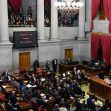A Tennessee city has agreed to end a year-long lawsuit with the American Civil Liberties Union and other groups over a drag ban that made national headlines last year.
The trouble began in 2023 after the non-profit LGBTQ+ rights advocacy group, Tennessee Equality Project (TEP), filed a federal lawsuit against the town of Murfreesboro. The lawsuit was the result of Murfreesboro city leaders saying they would no longer approve event permit requests filed by the Tennessee Equality Project. City leaders took issue with drag performances put on by the group during TEP’s 2022 Pride event resulting in what they called the “illegal sexualization of kids.”
TEP pushed back against the claims that there was sexualization of minors saying that all performers were fully clothed and that the show was not inappropriate. TEP says city officials mischaracterized the event through “opposition from a small, but vocal, email and social media campaign.”
Adding insult to injury, Murfreesboro city officials would go on to amend its “community decency standards” as a way to “assist in the determination of conduct, materials, and events that may be judged as obscene or harmful to minors.”
In its lawsuit, TEP argued, “The City officials mounted a two-front assault on TEP’s constitutional freedoms: first, using City Manager Tindall’s unfettered discretion to prohibit the City from issuing any further permits to TEP; and second, pushing for enactment of an ordinance designed to chill speech and expression that the officials were biased against—namely, drag performances and other pro-LGBTQ+ messages from TEP and the LGBTQ+ community of Murfreesboro.”
A federal judge would go on to temporarily block the city from enforcing the new ordinance as litigation continued. The city responded to the temporary block by amending the ordinance so that it no longer included “homosexuality” as prohibited “sexual conduct.” However, TEP said the revised amendment was not enough. The organization shared in response, “e will continue to challenge the remaining portions of this anti-LGBTQ+ ordinance until it is permanently defeated, and all residents of Murfreesboro know that their government officials have no right to censor LGBTQ+ people and our expression.”
Late last week, the ACLU announced that city officials agreed to roll back the revised ordinance and pay a $500,000 settlement to end the case.
After news of the settlement, TEP Executive Director Chris Sanders shared, “We celebrate the resolution of this case because it has guaranteed the rollback of a discriminatory policy and affirmed our right to host BoroPride,” adding, “Now we can turn our attention to preparing for the 2024 BoroPride festival and defending the rights of LGBTQ+ Tennesseans at the state legislature.”
Tennessee has been an outspoken voice in the national conversation surrounding trans rights. The state has enacted more anti-LGBTQ+ laws than any other state as far back as 2015, according to the Human Rights Campaign. Unsurprisingly, the state's anti-LGBTQ measures have been challenged with numerous lawsuits over the years. One such measure deflated in a September ruling by a federal judge that prohibited Blount County from banning drag performances at a pride festival. Another law passed in the state last year protects teachers and school employees from adverse employment actions for refusing to use a student’s preferred pronouns.
This back and forth between the state and pro-LGBTQ organizational leaders is expected to continue as there are presently 29 anti-LGBTQ bills in Tennessee's current legislative session.






